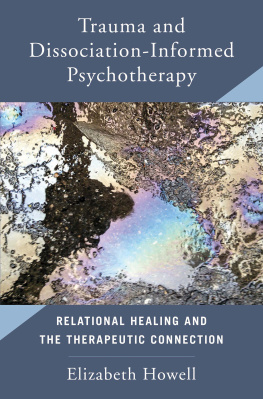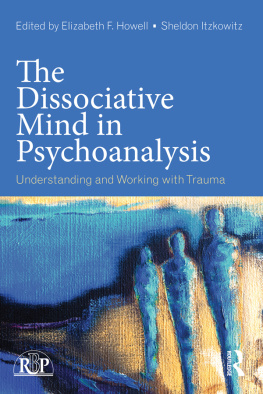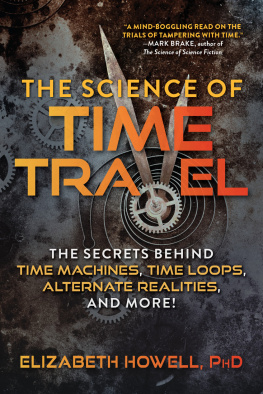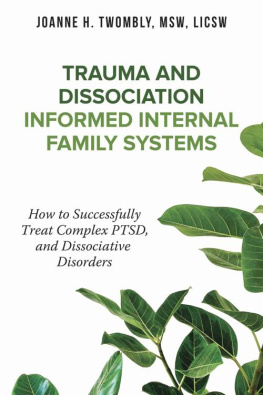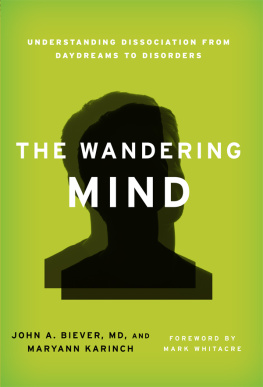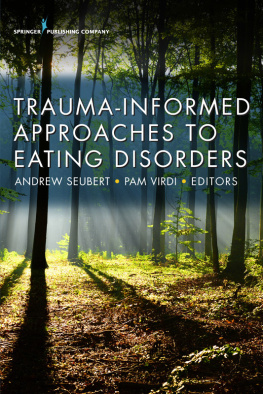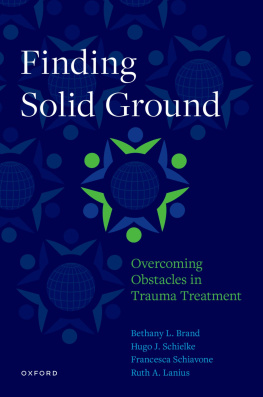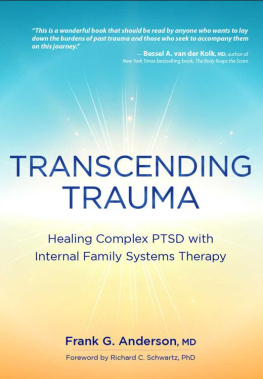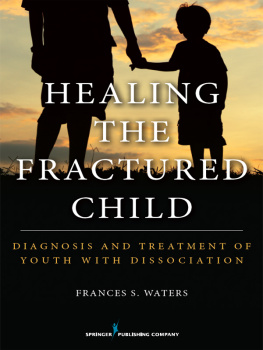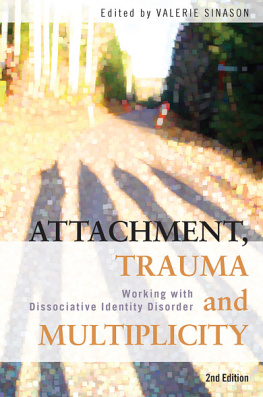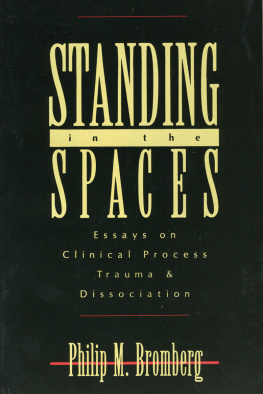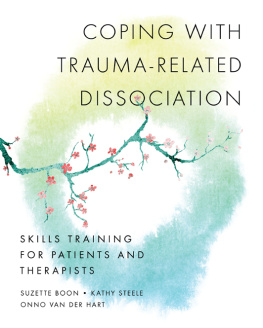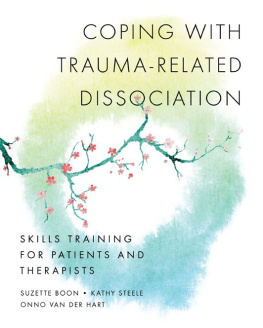
Trauma and
Dissociation Informed
Psychotherapy
RELATIONAL HEALING AND
THE THERAPEUTIC CONNECTION
Elizabeth Howell

W.W. NORTON & COMPANY
Independent Publishers Since 1923
A Norton Professional Book
Advance Praise
Elizabeth Howells new book provides a masterful synthesis of the vital revolution in trauma theory and practice over the last 25 years. In this illuminating, indispensable guide she weaves together the powerful insights of multiple disciplines with those of her own personal transformation as a relational trauma therapist. Dedicated to exploring the painful and complex reality of her subject, Howells book is an invaluable guide to the newly hopeful field of trauma therapy.
Jessica Benjamin, psychoanalyst and author of
Beyond Doer and Done ToandThe Bonds of Love
Elizabeth Howell writes from her heart, guided by her deeply felt and valued relationships with her patients, clearly cherished as her most important collaborators. Her original thinking shines through as she adds her own views and creatively spells-out and interprets the work of both psychoanalytic thinkers and traumatologists, an integrative feat few writers have achieved. Sit down with Howell, as I have, and enjoy her company. You will be delighted!
Richard A. Chefetz, M.D.,
Private Practice of Psychiatry, Washington, D.C.
Howells distinctive blend of trauma-informed clinical compassion, academic and analytic questioning reaches a new peak here. She exposes the trauma caused by Freuds creation of the Oedipus complex and the damage of one-person psychology. At the same time she offers hope through comprehensive non-dissociative theorizing, backed as always by solid clinical evidence. Gently, authentically, and relationally argued this is a powerful seminal bombshell of a bookalbeit an elegant one.
Valerie Sinason, Ph.D., British psychoanalyst and author
At the heart of Elizabeth Howells courageous thesis is the question: can contemporary psychoanalysis adapt to trauma and dissociation informed psychotherapy? She pulls no punches in offering scholarly yet confronting responses to offer a belated resolution to the 100-year trauma debate raging between Freudian repression and Janetian dissociation. Therapists and patients alike will greatly benefit from Dr. Howells parsimonious definition of trauma as that which causes dissociation. This radical reconceptualization has powerfully reshaped the future direction of trauma therapy as her clinically based discussions amply illustrate.
Dr. George Halasz, Adjunct Senior Lecturer, Monash University,
Melbourne, Australia, and child and adolescent psychiatrist
Clear, well-written, engaging. Valuable for clinicians at all levels.
Lucie Grosvenor, LCSW, Executive Director,
Psychoanalytic Psychotherapy Study Center
Page numbers listed correspond to the print edition of this book. You can use your devices search function to locate particular terms in the text.
abreaction
remembrance and, 9
ABS. see alternating bilateral stimulation (ABS)
absence
dissociated experiences as, 95
abuse
attachment-based defenses against acknowledging, 1819
child sexual see child sexual abuse
deprivation related to, 17879
neglect related to, 17879
rejection related to, 17879
trauma resulting from, 27
traumatic, 129
abuser(s)
in Oedipal theory, 1920
ACEs. see adverse childhood experiences (ACEs)
Ackerly, R., 113
adverse childhood experiences (ACEs), 5155
physical health effects of, 5155
trauma and dissociationrelated, xxi
affect(s)
conveying of, 67
isolation of, xiv
reducing and controlling intensity of, 4142
regulation of, 9899
strangulated, 9
affective arousal, 33
agency
critical, 132
Freudian model and, xviii
personal, 138
in repressed unconscious, 82
aggressor(s)
case example, 12425
identification with, xv, 12125
Ainsworth, M., 99
alloplastic
defined, 122
Alpert, J., 32, 135
Al Qaeda terrorists
WTC attack by, 3637
alternating bilateral stimulation (ABS)
in fear extinction, 188
America by Day, 108
amnesia, 4, 33
amygdala, 33
Anda, R.F., 51
anger in connection, 166
Anna O. see Pappenheim, B.
ANP. see apparently normal personality (ANP)
ANS. see autonomic nervous system (ANS)
anti-libidinal ego, 143
anxious ambivalent attachment, 99
anxious avoidant attachment, 99
anxious resistant attachment, 99
apparently normal personality (ANP), 21, 136
described, 14852
in DID, 15154
arousal
affective, 33
emotional, 33
Assault on the Truth, 13
association
lack of, 17677
attachment
anxious ambivalent, 99
anxious avoidant, 99
anxious resistant, 99
Bowlbys theory of, 9798
described, 9799
developmental dynamics of fear and, 11920
disconnection and, 12021
disorganized see disorganized attachment (DA)
dissociation and, 12021
earned secure, 102
generative, 166
importance of, 11819
insecure, 99
learning theories on, 98
need for, xix, 128
in reducing fear, 98102, 1067
secure, 99
attachment-based defense(s)
against acknowledging abuse, 1819
attachment-based dissociation, 12021
neurosis vs., xviii
attachment dilemmas
in criticizing oneself, xxiixxiii
attachment patterns
types of, 99
attachment system, 16163
case example, 16163
described, 9899
attachment theory
Bowlbys, 9798
described, 9798
IWMs in, 98, 101
trauma theory and, 98
attack(s)
self- see self-attack
attractor(s)
in state space, 177
attunement
dissociative, 73
Auerhahn, N.C., 97, 128
authority roles
in psychotherapy, 6163
authority structure, 6163
autobiographical memory, 32
autonomic nervous system (ANS), 116
dorsal vagal parasympathetic response of, 114
autoplastic
defined, 122
baby-watchers
scientific, 17778
bad me, 144
Barrett, D.L., 182
battle fatigue, 22
behavior(s)
DArelated, 1001
behavioral-mental states of being, 17778
behavior state(s)
discrete, 17677
betrayal blindness, 119
betrayal trauma, 119
better to be a sinner in Gods world, 12528
biological states
posttraumatic, 11417
blame-other patterns of thinking, xix
blame-self patterns of thinking, xix
blank screen psychoanalysts, 166
blindness
betrayal, 119
body(ies)
dissociation effects on, 4557
trauma effects on, 25, 4557
body psychotherapy
Janet and, 7
body rhythms
affects conveyed by, 67
bonding
traumatic, 120
Boon, S., 41, 42
borderline
defined, 56
borderline personality disorder (BPD), 56
DA as precursor to, 1012
fragmentation of psyche in, 146
PTSD and, 56
splitting associated with, 5657, 146
stable instability of, 146
borderline personality organization
defenses of, 14647
bottom-up processing, 4951
described, 49
Boulanger, G., 82
Bowen, M., 90
Bowlby, J., 9799, 113, 11819, 130, 14344
attachment theory of, 9798
Next page
